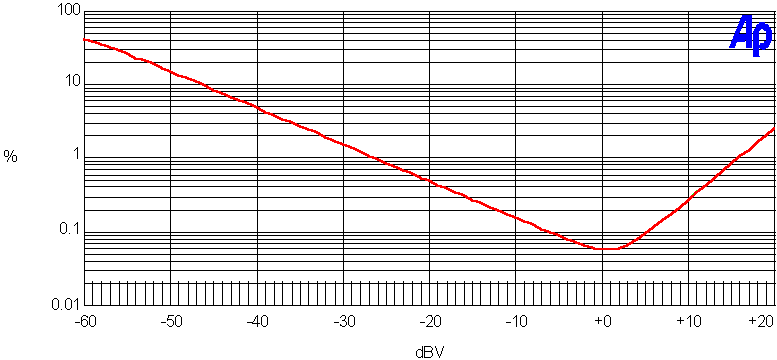

SSM2024 VCA

This circuit is included to compare the VCAs with
one that use a special-purpose IC. The SSM2024 is hardly the best
VCA chip from Analog Devices, but it was the only one that I
could obtain on short enough notice. The circuit is a simple one,
taken from the Analog Devices application notes. It gives a
linear control voltage response.
It turned out the performance was terrible with the load resistor
connected to ground. This circiut therefore connects it in
the feedback loop of an operational amplifier.
A bit surprisingly this circuit does not outperform the others.
It has very low distortion at moderate signal levels and the fact
that the CV bleedthrough is low without trimming is an advantage.
But the signal bleedthrough at higher frequencies is on the high
side. The noise figures are good but not better than the LM13600.
Also the distortion increase with increasing input levels, just
like the designs based on standard OTAs.
Noise & signal attenuation
Red = signal bleedthtrough at 0V CV. Blue = 10V CV, no signal. Green = 0V CV, no signal.

Distortion (THD+N) vs. input level

Frequency response

Test results
| Dynamic range | 10 V CV, no signal | 83 dBr A |
| 0 V CV, no signal | 109 dBr A | |
| 0 V CV, 1kHz 10 V p-p in | 94 dBr A | |
| 0 V CV, 2 kHz 10 V p-pin | 88 dBr A | |
| 0 V CV, 10 kHz 10 V p-pin | 74 dBr A | |
| Headroom (over 10V p-p) | 5 dB | |
| CV bleedthrough | no trimming needed | 15 mV |
Summary
Was expected to outperform the others by a wide margin, but didn't.
+
• Low CV bleedthrough without trimming
• Very low distortion at moderate levels
• Low noise
–
• Fairly high signal bleedthrough at higher frequencies
• Special purpose chip that can be difficult to obtain in the future